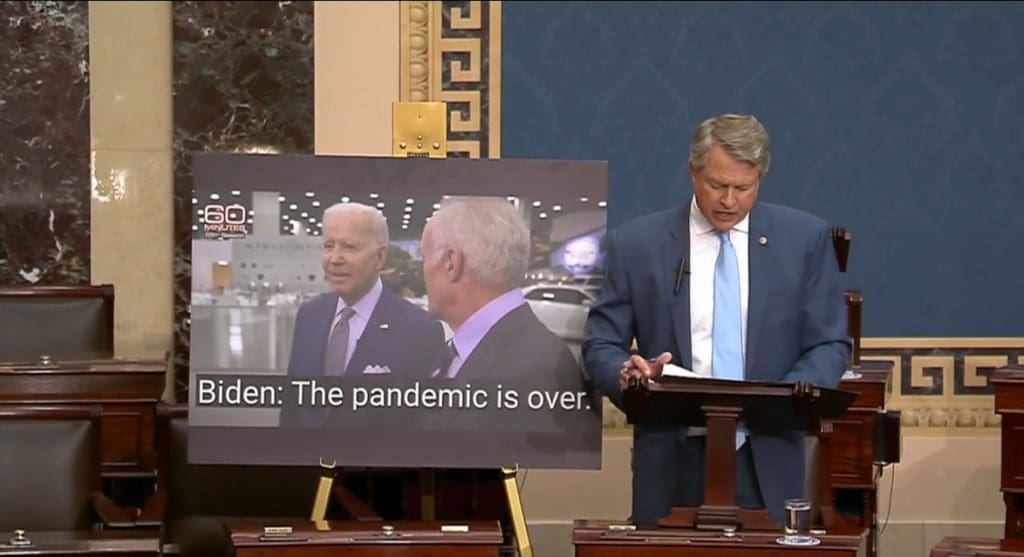Washington, D.C.– Today U.S. Senator Roger Marshall, M.D. requested that the U.S. Senate immediately approve his resolution to terminate the COVID-19 national emergency declaration. Senator Marshall’s resolution followed President Joe Biden’s comments that the coronavirus pandemic is over, yet the national emergency for COVID-19 has yet to be terminated by the White House. Unfortunately, Senate Democrats blocked Senator Marshall’s resolution. While you may click HERE or on the image below to watch his remarks on the Senate floor, Senator Marshall said in part,
“…It is this declaration, coupled with other additional emergency powers currently invoked by the President, which this administration is using to supersize government in order to continue their reckless spending spree and enact their radical partisan agenda. In fact, the White House uses these emergencies to justify their inflationary out of control spending, their unconstitutional vaccine and mask mandates, and to forgive student loans… In fact, even President Biden recently acknowledged during a 60 Minutes interview that the ‘pandemic is over…’ The Biden administration is keeping Americans under the strain of the national emergency declaration as if we are not living in a time of peace… In order to reign in this massive expansion of government, to slow down inflation, and restore Americans’ fundamental rights, we must take the important step of terminating the COVID-19 national emergency declaration…”
Background:
The Wall Street Journal covered Senator Marshall’s latest effort to end the COVID-19 national emergency declaration. Senator Marshall also recently joined Varney & Co. on Fox Business to talk about his resolution. You may click HERE or on the image below to watch the full interview.
In March 2020, President Donald Trump invoked the National Emergencies Act (NEA) in regard to COVID-19. In February 2021 and then again in February 2022, President Joe Biden extended it. A provision in the NEA grants Congress termination review of national emergencies, stating that after six months, and every six months after the emergency continues, “each House of Congress shall meet to consider a vote on a joint resolution to determine whether the emergency shall be terminated.” However, Congressional interpretation of this law has determined that the absence of a resolution introduced by any member signals unanimous consent for continuation. In failing to meet, debate, and vote on an emergency, Congress is effectively ceding more unchecked emergency powers to the executive similar to its failure to enforce War Powers provisions.
On March 3, 2022, Senator Marshall’s resolution to end the COVID-19 national state of emergency passed the Senate by a vote of 48-47. On that same day, the White House issued a veto threat of Sen. Marshall’s resolution, and the U.S. House of Representatives failed to take up the measure. Under the NEA, Congress is mandated to determine whether the emergency should continue, a process Congress has not fully enforced, ceding power to the executive. You may click HERE to view the resolution. Senators Mike Braun (IN), Mike Lee (UT), Ted Cruz (TX), and Rand Paul (KY) Rick Scott (FL), Steve Daines (MT), Ron Johnson (WI), and James Risch (ID) cosponsored Senator Marshall’s resolution. The NEA outlines an expedited parliamentarian procedure for emergency termination resolutions. Once the resolution is introduced and approved by the parliamentarian, it is referred to the Committee of jurisdiction, the Senate Committee on Finance in this instance. The committee of referral is to report one joint resolution along with its recommendations within 15 calendar days after the day of referral, unless the chamber “shall otherwise determine by the yeas and nays.” Once reported, the terminating resolution “shall become the pending business” of the chamber and a vote on final passage is to occur within three calendar days thereafter (unless the chamber “shall otherwise determine by yeas and nays”).













